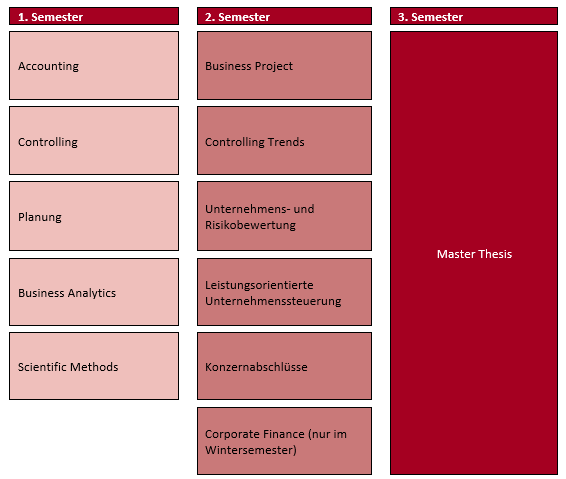Profile
The Master's degree program in Controlling (full-time) is aimed at prospective students who wish to qualify for demanding specialist and management tasks in controlling.
In addition to the basics of controlling, the course also teaches distinctive skills in strategic and operational corporate management, the interaction between controlling and financial accounting as well as the necessary IT knowledge in the context of data analytics and SAP.
Controllers take on different roles in their day-to-day work: they are moderators, consultants, coordinators and sometimes also controllers.
In order to do justice to these roles, the degree programs not only train professional and methodological skills, but also promote personal and social skills through seminars and presentations.
Career prospects
Areas of responsibility may include
- Advising the company management
- Development and maintenance of internal information management
- Monitoring and controlling operational processes
- Development and evaluation of key figures
- Analyzing and forecasting business trends
- Target/actual comparisons
- Budgeting
- Monitoring the internal planning and reporting system
- Planning and implementing strategic measures
Depending on your qualifications and preferences, you can also specialize in one area (organizational controlling, purchasing controlling, sales controlling, project controlling, personnel controlling, etc.).
There are good opportunities for promotion up to the head of a controlling department.
5 reasons for the degree programs
Excellent reputation: The Ludwigshafen University of Business and Society enjoys an excellent reputation in the business world. The Master's in Controlling is known for its high quality and practice-oriented training.
Practical training: The degree programs attaches great importance to imparting knowledge that is relevant to practice. You will be taught by experienced lecturers who have extensive experience in the field of controlling. This gives you a realistic insight into the working world and prepares you well for a future career.
Network: At the Ludwigshafen University of Business and Society, you will have the opportunity to make valuable contacts. Through events, internships and projects, you will come into contact with companies and experts from the industry. This network can be of great benefit to you later when you are looking for a job or setting up your own projects.
Interdisciplinary orientation: The Master's degree program in Controlling at the Ludwigshafen University of Business and Society offers a wide range of modules that go beyond pure controlling. You will also acquire knowledge in the areas of financial management, corporate management and strategic management. This will provide you with a holistic education that will open up a wide range of career opportunities.
Career opportunities: Graduates of the Master's degree program in Controlling at the Ludwigshafen University of Business and Society have excellent career prospects. Controlling is a sought-after specialist area in companies in all sectors. With your degree, you will be able to take on responsible positions in controlling departments or in management consulting.

Why choose Ludwigshafen as a place to study?
The city of Ludwigshafen is located in the middle of the metropolitan area Rhine-Neckar with around 160,000 companies (including 10 of the 100 largest listed and internationally active companies such as BASF, SAP, Roche, Heidelberger Druckmaschinen, HeidelbergCement, KSB or Fuchs Petrolub, many medium-sized companies, hidden champions and innovative start-ups), 800,000 employees and a gross value added of over 62 billion euros.
The region is an important center for research and science with a large number of renowned institutions. These include 23 universities and colleges as well as more than 30 prestigious research institutes such as the European Molecular Biology Laboratory, four Max Planck Institutes, the German Cancer Research Center and the Center for European Economic Research.
In addition to an excellent infrastructure with around 240 long-distance departures daily & good public transport, 8 highways in the immediate vicinity and only 30 minutes to Frankfurt International Airport, the region also offers a wide range of cultural and leisure activities with more than 230 museums, 110 theaters and many concerts and festivals, four UNESCO World Heritage Sites, over 120 castles and palaces and three nature parks.
LUst on foreign countries?
Ludwigshafen University of Applied Sciences has around 150 partner universities all over the world - in almost all EU countries, but also in the USA, Australia, Taiwan and Korea, for example. Stays abroad in the form of an internship or a semester abroad enable students to acquire a wide range of intercultural skills. The stays abroad can be recognized with credit or on a voluntary basis as an additional semester.
We are of the opinion that a semester abroad is always a plus on your CV and absolutely justifies extending your studies!
Contents & Procedure
Study structure
3-semester on-campus course with 10 compulsory modules in the first and second semester (in the winter semester there is an additional module to choose from) and the Master's thesis in the third semester (lecture days Monday - Saturday).
1st semester
In the first semester, students deepen their knowledge of controlling (including IT) and broaden their knowledge of research methodology.
Accounting
Develop a critical understanding of the rules and implications of international accounting and the diversity of concepts, terminology and doctrines in internal accounting.
Controlling
Teaching the basic concepts / methods of strategic and operational controlling
Planning
Case study as a basis for assessing, commenting on and arguing for planning results. Promoting the ability to independently acquire new knowledge and skills.
Business Analytics
IT toolbox for solving operational decision-making problems.
Scientific Methods
Teaching skills in scientific work and research methodology by designing small research projects. Management of employee and communication behavior.
2nd semester
In the 2nd semester, students specialize in various areas of controlling. In the winter semester there is a further module to choose from.
Business Project
Handling of specific projects to teach the theoretical principles of project management and learning suitable tools and techniques to successfully carry out a project.
Controlling Trends
Sustainability in corporate management and sustainability controlling supplement traditional controlling approaches with social and ecological aspects.
Company and risk assessment
Develop a broad and critical understanding of the methods used to assess company values and risk structures in order to ensure the long-term existence of companies.
Performance-oriented corporate management
Knowledge of the value-oriented management of companies is imparted.
Consolidated financial statements
Consolidated financial statements from practice should be read and understood. They should be scrutinized, broken down and reassembled into information relevant for analysis
Corporate Finance
Get to know and appreciate financial goals and fields of action. Learn business and financial planning methods for start-ups.
Controlling (Master of Arts): Overview of the course structure
Following the compulsory and compulsory elective modules (1st and 2nd semesters), the 3rd semester includes the Master's thesis, which takes 6 months to complete.
Application & Admission
The "Apply" button will take you to a brief guide on how to register and apply.
If you are not sure which documents you need to upload to the portal, you will find an overview here:
General application forms:
admisson requirements
Completed degree in economics or a comparable subject (business studies component at least 50%) with 210 ECTS and a minimum grade of 2.5.
If you have not yet completed your studies, you may only have a maximum of 30 ECTS remaining by the application deadline. Further information can be found here.
We offer applicants with a Bachelor's degree of 180 ECTS the opportunity to make up the missing 30 ECTS before registering for the Master's thesis. Further information can be found here.
Application deadlines
Since the summer semester 2022, there is no longer a limit on places on the Controlling degree program (Master of Arts). This means that all students who meet the admission requirements of the special examination regulations will be admitted.
Application for the winter semester:
August 1 of the current year
Application for the summer semester:
February 1 of the current year
The team at the Student Service Center (SSC) looks forward to meeting you
The SSC staff responsible for application management advise prospective students on all aspects of the application process. They are the right people to contact for all questions relating to application and admission/access to studies at the Ludwigshafen University of Business and Society.
E-mail: ssc-bewerbung@ 8< SPAM protection, please remove >8 hwg-lu.de
Telephone: +49 621 5203-0
For subject-related questions, please get in touch with the relevant contact person for your desired degree program.
Opening hours of the SSC
Mon. and Tue.
09:30 - 12:00
Thu
09:30 - 12:00 and 14:00 - 16:30
Wed and Fri
closed


